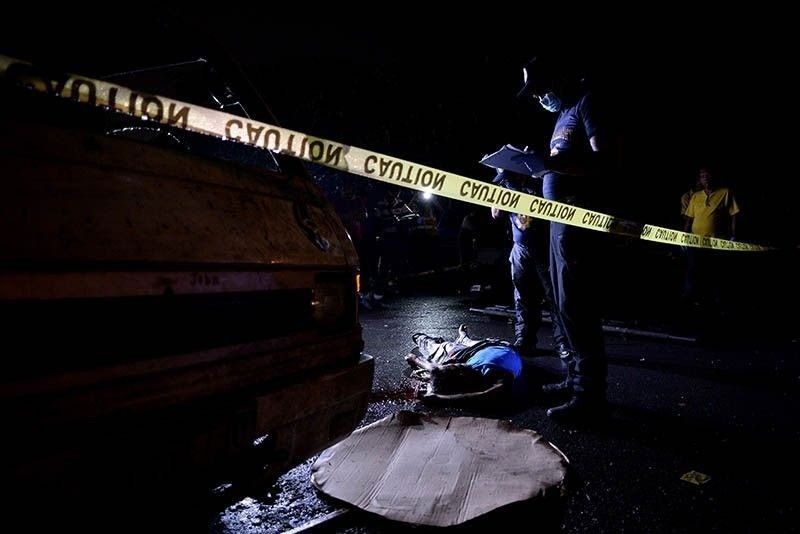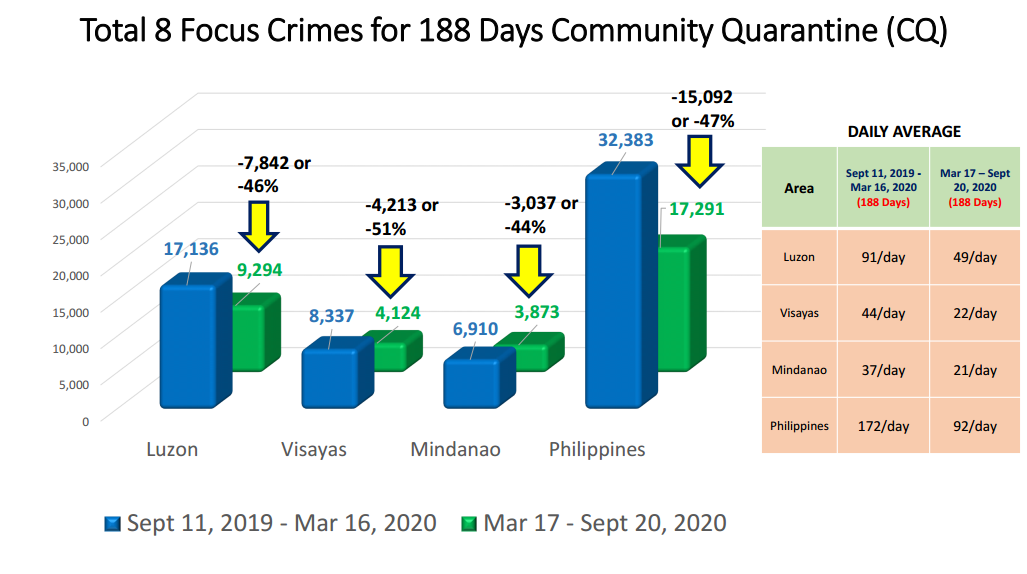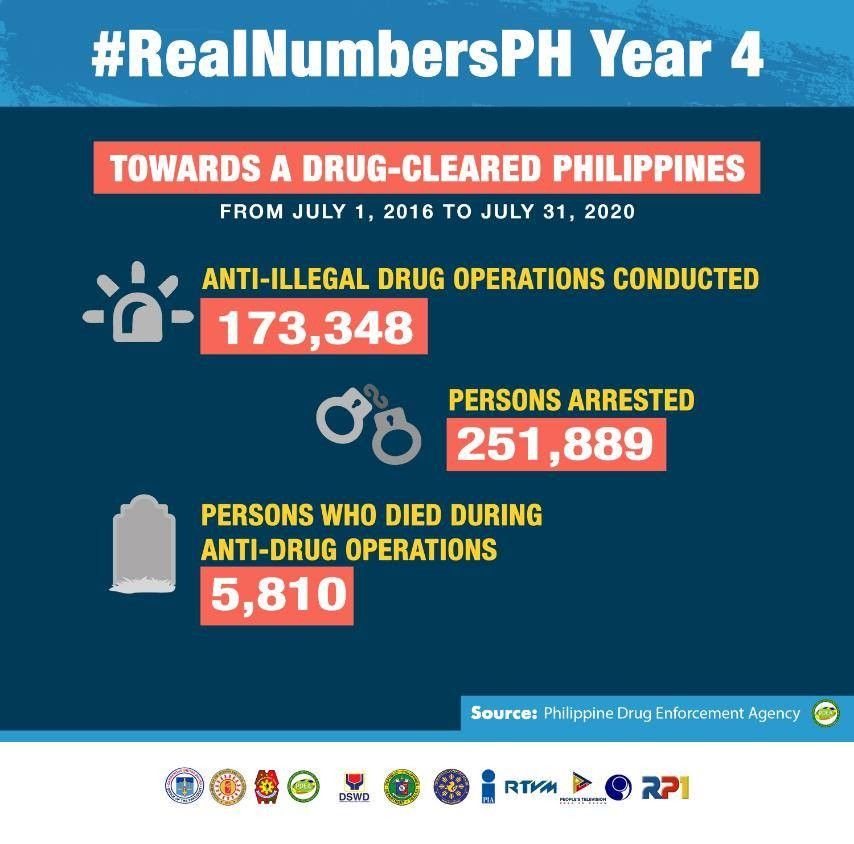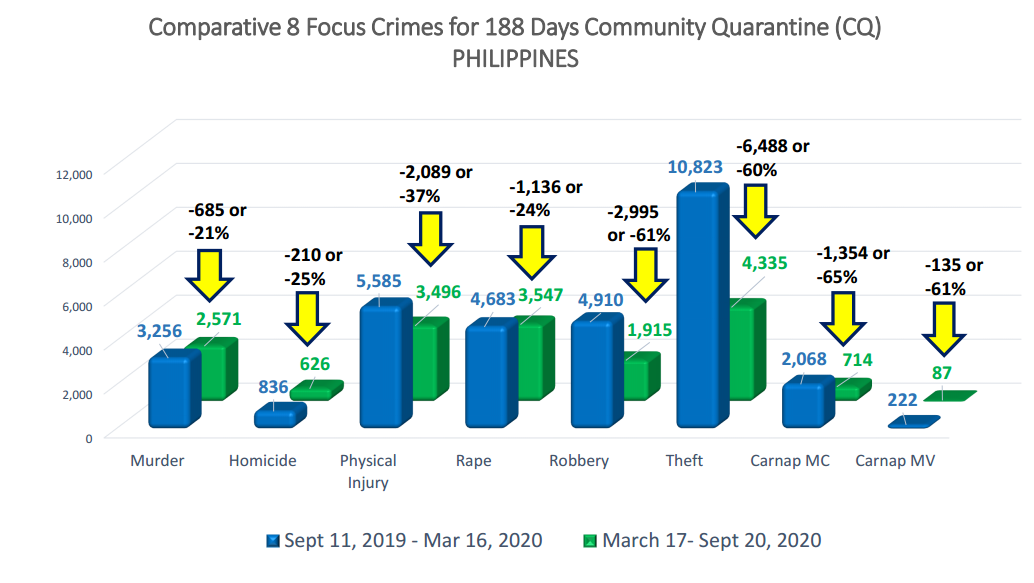Fact check: Reported increase in 'drug war' deaths amid pandemic is backed by gov't data

MANILA, Philippines — Contrary to Interior Secretary Eduardo Año's claim that rights groups' statements about the increase in drug-related deaths over the coronavirus pandemic are "fake news," government data actually proves these to be true.
"The whole country knows that the PNP has been very busy in COVID response, implementing quarantine regulations and minimum health standards since the beginning of the pandemic," the Department of Interior and Local Government said in a statement issued Monday night, which announced a 46.7-percent decrease in index crime volume.
The decrease was meant to disprove the assertion that there has been an increase in 'drug war' deaths.
READ: Año confident government can disprove alleged killings, rights violations
Año was employing a figure provided by the Joint Task Force COVID Shield, the quarantine enforcement arm of the coronavirus task force, that measured the total eight focus crimes for the 188 days that community quarantine was hoisted and compared them to the 188 days before the ECQ.
The eight focus crimes listed in the JTF CV Shield's data, however, do not include drug-related cases, only murder, homicide, physical injury, rape, robbery, theft, and carnapping.
While the interior secretary pointed at a decrease in crime in arguing against the increase in drug deaths and in defense of the campaign against illegal narcotics, the chief of the national police did the exact opposite by highlighting the many drug cases and providing figures to indicate the supposed successes of the "drug war."

At his press briefing on Monday, Police Gen. Camilo Cascolan told reporters: "I would like to point out that over a 17-day period from September 2 to September 19, the PNP has conducted 2,570 separate anti-illegal drugs operations that resulted to the arrest of 3,615 drug offenders and the confiscation of 16.7 kilograms of shabu estimated to be worth P114-million in the street market."
"In fact, we have made great strides in the supply reduction strategy against illegal drugs such that, of late, there is no reported local production of Shabu in the country and that drug trafficking activities have been significantly checked due to pressure from police operations," he added.
Police leadership over the coronavirus pandemic has stressed on more than one occasion that operations against illegal drugs would still be among the PNP's top priorities moving forward.
RELATED: PNP: Anti-drug operations 'will be unrelenting as ever' amid COVID-19 crisis | Anti-drug operations top PNP command guidelines heading into 4th week of Metro Manila GCQ
In attempting to rebut the claim by the New York-based Human Rights Watch, Año said: “These are nothing but baseless and bloated allegations of the leftist groups and their cohorts claiming an increase on extra-judicial killings just to mislead the public and demonize the administration."
Speaking in an interview aired over CNN Philippines on Monday, the interior secretary also said: "I will make sure that those allegations, we'll be able to prove that they aren't true...We have to verify [those claims]…Those are allegations from critics, from the leftist groups, from human rights groups. We are checking those data. I really do not agree."
Interior spokesperson Jonathan Malaya also "urged the netizens to first check the sources and facts before they click, like, and share on the information that they come across on various online mass media entities as well as social media platforms like Facebook, Twitter, and Youtube."
The DILG said that the index crime volume nationwide actually went down by 46.66% since the start of the COVID-19 pandemic rebutting claims by Leftist groups that deaths from the government anti-drug campaign allegedly increased during the pandemic. https://t.co/hRIdZXbia4 pic.twitter.com/eba91IUKhS
— DILG Philippines (@DILGPhilippines) September 22, 2020
Real numbers came from real people and 'Real Numbers'
Whether Año "agrees" with the claim or not, and whether crime volume as a whole went down or not, the increase in drug war deaths is corroborated by data from the Real Numbers PH campaign, which aggregates data from a number of agencies including the Philippine National Police—an attached bureau under Año's interior and local government department.
Data from the Philippine Drug Enforcement Agency posted publicly on the Real Numbers PH official Facebook page shows that 155 persons listed as "drug suspects" were killed from March 31 to July 31, while the same campaign admits that police killed 103 persons from December 2019 to March 2020.
The same numbers show that between March 31 to July 31, police conducted 10,663 anti-illegal drug operations. As a result, Real Numbers listed 1294 additional "drug-cleared barangays" in that time span. Before the pandemic, from November 30, 2019 to January 31, 2020, police only killed 49 people during anti-drug operations.
The Real Numbers PH campaign is the administration's central counting project meant for the public to "know the real numbers on the campaign towards a drug-free PH, providing monthly tracking of information on operations," though it has not yet provided any figures from July 31 to the present.
As of its July 31 update, the Real Numbers acknowledges 5,810 deaths as a result of anti-drug operations. Rights groups both local and abroad have said the number may be closer to 30,000. Police Gen. Camilo Cascolan, though, has claimed that extra-judicial killings do not exist and than many police officers have died during anti-drug operations.
READ: Despite police claims, drug war killings continue amid COVID-19 lockdown — int'l rights monitor

At an earlier press briefing, Conde told reporters that the nightly killings linked to the so-called war on drugs went on undisturbed with most of Metro Manila stuck indoors. Worse, he said, the COVID-19 pandemic also made it more difficult to document, investigate, and report on the killings.
"The number of fatalities in these ostensible drug enforcement raids, in which the police routinely claimed that the victims fought back, jumped dramatically from the 26 deaths recorded by the PDEA in five months from July to November 2019," Human Rights Watch Asia division researcher Carlos Conde wrote in the report contested by the DILG.
"The government is expected to continue to deny the allegations rather than offer a constructive response. But as the government’s own statistics show, the atrocities in the 'drug war' have worsened, even as the country suffers the worst in the region from the pandemic," he also said.
In an earlier report, Human Rights Watch also noted that its analysis was based on government data and, according to its methodology, "primarily on in-person interviews that Human Rights Watch carried out between March 2018 and February 2020 in Manila, Caloocan City, Quezon City, Cebu City, General Santos City, and Quezon province."
A separate report by VERA Files carried by Philstar.com also logged 53 drug-related killings since the announcement of enhanced community quarantine in March up until May, though it was careful to note that not all of the killings were linked to police operations.
Philstar.com has reached out to Human Rights Watch for comment, though it has not responded as of this post.

- Latest
- Trending
































